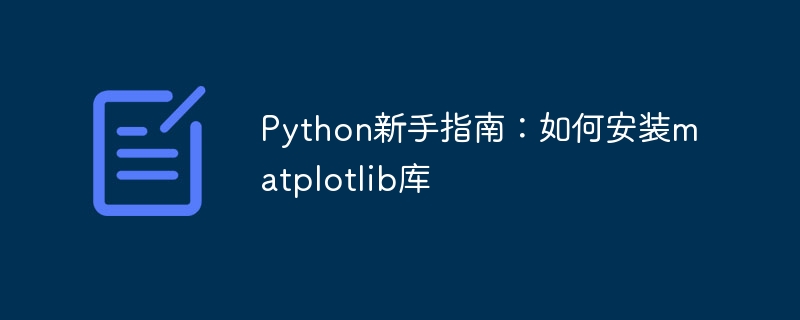
Python新手指南:如何安装matplotlib库,需要具体代码示例
引言:
matplotlib是一个广泛使用的Python数据可视化库。它可以用于绘制各种类型的图形,包括线图、柱状图、散点图、饼图等。本文将介绍如何安装matplotlib库,并提供具体的代码示例,以帮助Python新手轻松上手。
第一步:安装Python环境
在开始安装matplotlib之前,我们需要先安装Python环境。可以从Python官方网站(https://www.python.org)下载并安装最新版本的Python。
第二步:安装pip
pip是Python的包管理工具,它可以简化安装第三方库的过程。通常,Python安装过程中会默认安装pip。可以通过命令行输入以下命令来验证是否安装了pip:
pip --version
如果显示pip的版本信息,说明pip已经安装成功。如果没有安装,可以在命令行中输入以下命令来安装pip:
python -m ensurepip --upgrade
第三步:安装matplotlib库
一旦pip安装成功,就可以使用它来安装matplotlib库了。在命令行中输入以下命令:
pip install matplotlib
等待一段时间,pip会自动下载并安装matplotlib库及其相关依赖。
第四步:验证安装
安装完成后,我们需要验证matplotlib是否正确安装。可以在命令行中输入以下命令来验证matplotlib的版本信息:
python -c "import matplotlib; print(matplotlib.__version__)"
如果显示了matplotlib的版本信息,说明安装成功。
第五步:使用matplotlib绘制图形
现在我们已经成功安装了matplotlib库。下面我们来看一些具体的代码示例,展示如何使用matplotlib绘制图形。
绘制简单的折线图:
import matplotlib.pyplot as plt x = [1, 2, 3, 4, 5] y = [1, 4, 9, 16, 25] plt.plot(x, y) plt.show()
绘制柱状图:
import matplotlib.pyplot as plt x = ['A', 'B', 'C', 'D', 'E'] y = [10, 15, 7, 12, 8] plt.bar(x, y) plt.show()
绘制散点图:
import matplotlib.pyplot as plt x = [1, 2, 3, 4, 5] y = [1, 4, 9, 16, 25] plt.scatter(x, y) plt.show()
绘制饼图:
import matplotlib.pyplot as plt
labels = ['A', 'B', 'C', 'D']
sizes = [15, 30, 45, 10]
plt.pie(sizes, labels=labels)
plt.axis('equal')
plt.show()通过以上代码示例,你可以更好地理解如何使用matplotlib库来绘制各种类型的图形。
总结:
本文介绍了如何安装matplotlib库,并提供了具体的代码示例来演示matplotlib的基本用法。希望这篇文章能帮助Python新手快速上手matplotlib,从而更好地进行数据可视化。要深入了解matplotlib的更多功能和用法,请访问官方网站(https://matplotlib.org)。祝你在Python的数据可视化旅程中取得成功!
以上就是入门指南:安装matplotlib库的步骤详解的详细内容,更多请关注php中文网其它相关文章!

每个人都需要一台速度更快、更稳定的 PC。随着时间的推移,垃圾文件、旧注册表数据和不必要的后台进程会占用资源并降低性能。幸运的是,许多工具可以让 Windows 保持平稳运行。

Copyright 2014-2025 https://www.php.cn/ All Rights Reserved | php.cn | 湘ICP备2023035733号